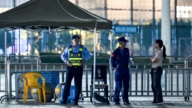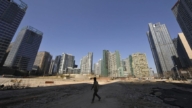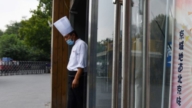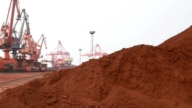【新唐人2015年01月08日讯】深圳最大的房地产开发商佳兆业集团控股有限公司,日前爆发贷款违约,金额达5200万美元。据了解,这是中国2015年第一宗企业融资违约案。有分析指出,佳兆业集团的违约,有可能成为中国房地产崩盘的先兆。
佳兆业集团是深圳的土龙头房企,于2009年12月在香港交易所上市。去年上半年,佳兆业以16.7万平方米,1801套房产的成交量、41亿元人民币的成交金额,一举超过中国房企龙头万科在深圳的业绩,摘下深圳楼市成交量、成交金额的双料冠军。
然而,让人意外的是,这样一家顶着靓丽业绩头衔的企业,在短短半年时间,就爆出了贷款违约消息。
据了解,事件起因于佳兆业前董事会主席郭英成的离职事件。佳兆业在2013年8月,与香港汇丰银行签定的4亿港元(约5200万美元)的贷款合约中载明,一旦郭英成离职,佳兆业应在离职生效当天,偿还所有的贷款及利息。
郭英成的离职案在去年12月31号正式生效,但佳兆业却在今年1月1号晚间宣布,无法偿还这笔5200万美元的贷款。
佳兆业集团在提交给香港交易所的报告中坦承,这次违约可能对公司的财务状况造成重大不利影响,公司其他贷款融资及所发行的债券和股本证券,也可能受到影响。
北京师范大学MBA导师、经济专栏作家段绍译指出,在未来一年内,大陆可能每天都会出现房企贷款违约事件。
段绍译:“过去的几年,房地产泡沫很严重,在暴利的驱使下,使很多的老板,就高成本去融资,盲目去扩张,但没想到现在这个情况急转直下,使很多的房地产老板变成没有利润,或者是国家收缩银根,造成很多的企业资金链断裂。深圳这个案子只是一个开始,在未来一年内,每个星期都可能会出现这样的现象,甚至每天都会出现这样的现象。”
据《华尔街日报》报导,佳兆业集团的离岸债券价格1月2号大幅下跌,债券收益率被推升至50%以上,而集团股票也从去年12月停牌至今。
报导说,穆迪投资者服务公司(Moody’s Investors Service)近日下调佳兆业的信用评级,标准普尔也在去年12月,对佳兆业的前景发出了警告。
时政评论员伍凡:“关键在于市场上的房子太多了,从2011年以来,已经盖好的房子有20亿平方米,可是市场上只需要12亿,那你多出8亿了,可是现在还在开工60亿,所以就造成普遍的房地产公司要倒闭,深圳这个公司在2015年打了头炮,恐怕今年有一系列的倒闭现象会发生。”
有关郭英成离职的原因,至今尚不明朗,不过外界认为,与反腐不无牵连。去年10月,深圳市委原常委、政法委书记蒋尊玉和郭英成,一前一后被有关部门带走。去年11月,深圳市政府有关部门叫停佳兆业在深圳所有的房地产专案项目,数量高达上千套楼盘。
段绍译:“确实中国官商勾结是很严重的,一旦企业涉入政府的贪腐案,它肯定会受到一些牵连,一些损失,尤其综合实力不是很好的企业,有一点风吹草动都可能使这个企业面临灭顶之灾。”
不过,时政评论员伍凡认为,房地产开发商倒闭的根本原因在于市场因素。
伍凡:“里面有没有贪污腐败,有,但是在前几年或10几年前,当你房地产火火热热的时候,把所有贪污的事情掩盖起来了,现在你还不出钱来,那么贪污事情就曝光了。再加上现在反贪,中纪委抓人,市委书记、市长恐怕也涉及在里头。这种我觉得不是大原因,最根本的原因是市场造成的。”
伍凡表示,除了大陆房地产行业严重的供过于求,房子卖不出去外,还有一个国际因素,就是美元升值,强势美元会使得大陆房企的债务成本增加。因此,伍凡预测,大陆的房地产开发商,今年会非常惨,中国的房地产甚至可能走向崩溃。
采访/易如 编辑/陈洁
China’s First Property Loan Default, 2015: Kaisa Group
Shenzhen’s largest real estate developer Kaisa Group
has defaulted on a $52-million loan, the first in 2015.
It’s believed to indicate China’s real estate collapse this year.
Kaisa Group Holdings was listed on the Hong Kong
Stock Exchange in Dec. 2009.
In the first half of 2014, it replaced the leading real estate
developer, China Vanke, in position in Shenzhen
with its volume of sales and turnover.
Kaisa topped the Shenzhen market with a total of 1,801
real estate sales, worth 4.1-billion yuan.
just six months after its outstanding performance,
Kaisa defaulted on its loan payment.
Kaisa Chairman, Kwok Ying Shing’s departure
from the company is believed to be the cause.
The loan taken from HSBC for approximately US$51-million
(400-million HK dollars) in Aug. 2013 was due to be repaid
with interest on Dec. 31, 2014—the day Kwok resigned.
Kaisa announced the default on the evening of Jan. 1, 2015.
In a report to the Hong Kong Stock Exchange, Kaisa admitted
that the breach could have an adverse effect on the security
of the company’s finance, other loans, bonds and equity.
Economist Duan Shaoyi anticipates that defaults on loan
repayments are likely to occur regularly in China in 2015.
Duan Shaoyi: “The real estate bubble has been very serious
over the past years; driven by profit, owners blindly
expanded their businesses at high cost, but the sharp
downturn in the housing market has left many without profit
and the dwindling money supply from the state has resulted
in a breakage in the chain of funds."
“This case in Shenzhen is just a beginning—in 2015,
similar cases may emerge weekly, or even daily."
The Wall Street Journal (WSJ) reported the market value
of Kaisa halving since problems started a month ago.
Its stock trading was suspended in December.
Rating agency, Moody’s Investors Service last week
downgraded the company’s credit ratings, reported WSJ.
Standard & Poor’s also issued a warning
on Kaisa’s potential default in December.
Wu Fan, Current Affairs Commentator: “The key issue is that
there are too many houses on the market."
“Since 2011, as much as two-billion square-meters of
property is available, but market needs are only 1.2-billion."
“On top of the excessive 0.8-billion, another six-billion
square-meters of property is under construction."
“The property industry’s closure is going to be widespread;
Shenzhen took the first hit in 2015, and more is inevitable."
The reason for Kwok Ying Shing’s resignation is unclear, but
is generally believed to be linked to the anti-graft campaign.
Last October, Jiang Zunyu, the former secretary of
Shenzhen’s Politics and Law Commission, and Kwok were
respectively taken away by authorities.
In November, the Shenzhen government halted all of Kaisa’s
projects, involving thousands of sets of real estate.
Duan Shaoyi: “Collusion in China is really very serious;
once a company is involved in a corruption case,
it will certainly suffer losses, and for a weak business,
any sign of trouble can cause it to shut down."
Wu Fan believes market factors are the cause of failure
for real estate developers.
Wu Fan: “Is corruption involved? Yes—when real estate
was thriving a few years ago, or a decade ago,
the corruption was covered up, but now it has been exposed
because the loan is defaulted."
“The anti-graft campaign especially has implicated many,
including the Party secretary or mayor."
“But I don’t think it’s the main reason for failure—
the market is the reason."
Wu Fan says that in addition to the serious over-supply
in the property sector, there is also an international factor
involved—the appreciation of the dollar, as a strong dollar
increases the cost of debt in housing.
Wu Fan anticipates the property industry in China
to have a tough time in 2015 and even collapse.
Interview/YiRu Edit/ChenJie



























